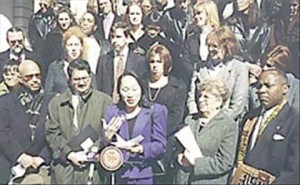 Simplicity That Should Strike Everyone
Simplicity That Should Strike Everyone
Pauline Park leads the charge at City Hall.
(photo lgny)
NYC Transgender Activists Push Human Rights Amendment
By Paul Schindler
Lesbian & Gay New York
3.10.2000
More than two dozen transgender activists and City Councilmembers appeared on the steps of City Hall February 29 to propose an amendment to the city’s human rights ordinance to include protection against discrimination based on “gender identity and expression.”
The city’s ordinance currently provides protections against discrimination based on a broad range of categories including race, religion, sex, national origin, disability, and sexual orientation.
The announcement came at a press conference led by the New York Association for Gender Rights Advocacy (NYAGRA), which last year convened a legislative work group that included six City Councilmembers to investigate how best to address issues of transgender discrimination. The six Council members of the task force — Margarita Lopez, Christine Quinn, Phil Reed, Bill Perkins, and Ronnie Eldridge of Manhattan and Steve DiBrienza of Brooklyn — have now requested that Council legal staff draft the human rights ordinance amendment.
In opening the press conference, Pauline Park, a NYAGRA activist who served as coordinator of the legislative work group, positioned the proposed measure in the context of the broader historical expansion of civil rights protections.
“Today we pose the following question: when Jefferson declared that ‘all men are created equal,’ did he also mean to include men born female or women born male? Or those born neither wholly male nor female?” Park asked. “As we stand here on the steps of City Hall… we need not be bound by the limitations of the Founders and their willingness to accept the disenfranchisement of the overwhelming majority of their contemporaries. Rather, we may bring the logic of human rights discourse to its logical conclusion.”
Melissa Sklarz, who last year became the first openly transgender public official in New York State with her election as a Democratic county judicial delegate in Manhattan, spoke about the effect her transition in the ‘80s to a female identity had on her life.
“It eliminated my middle class upbringing,” Sklarz said. “It eliminated my white skin. It eliminated my education. It eliminated my work experience. I started out new.”
Phil Reed, a gay African American who represents the 8th Council District in upper Manhattan and the Bronx, echoed the view of activists that the proposed amendment was the logical next step on the human rights front.
“The simplicity of this should strike everyone,” Reed said.
If the amendment is passed, New York City would become the 27th jurisdiction in the nation to offer protection to transgendered people. It is also the first municipality in this state to consider such a move.
The human rights ordinance’s last major amendment came in 1986, when after a battle of more than 15 years, it was expanded to cover sexual orientation discrimination.
Speakers addressed the benefits that an amendment would provide to transgendered residents. Charles King, co-executive director of Housing Works, the AIDS advocacy group, discussed problems transgendered people encounter in gaining access to social services in areas such as employment and housing, and the way in which those barriers increase the risk for diseases such as HIV infection.
“This measure would send a signal to social service and health providers and city government agencies that prejudice will not be tolerated,” King argued.
NYAGRA has lined up impressive backing for the proposed legislation. According to Park, at least 17 Councilmembers out of 51 have signed on in support, with at least four to five more leaning that way. The measure has also been backed by a broad coalition of organizations, including the Empire State Pride Agenda, the Anti-Violence Project, the National Gay and Lesbian Task Force, the Gay and Lesbian Independent Democrats, and the Audre Lorde Project. Outside the queer community, NYGRA has also won the support of the National Organization for Women and the District Council 37 labor leadership.
Despite this breadth of support, advocates, particularly those on the Council, were cautious in assessing the prospects for progress on the measure.
Referring to City Council Speaker Peter Vallone, a Queens Democrat, Perkins said, “There is some work to do with the leadership. But, I am confident that they will see the light sooner rather than later.”
Eldridge suggested that final action on the measure might not come until after the 2001 elections, when much of the current Council membership, including Vallone, will face term limitation-imposed retirement.
It is known that Vallone does not currently support the proposed amendment, but unclear how strongly he would work to oppose it. As majority leader of the Council in the ‘80s, Vallone for several years blocked consideration of the sexual orientation amendment, before finally allowing a 1986 vote despite his continued opposition. One early signal may be whether Vallone assigns the matter to committee, and to what committee. If DiBrienza’s General Welfare Committee is given jurisdiction, the Brooklyn Councilmember, expected to seek citywide office as Public Advocate in 2001, will likely be an ardent champion of the measure.